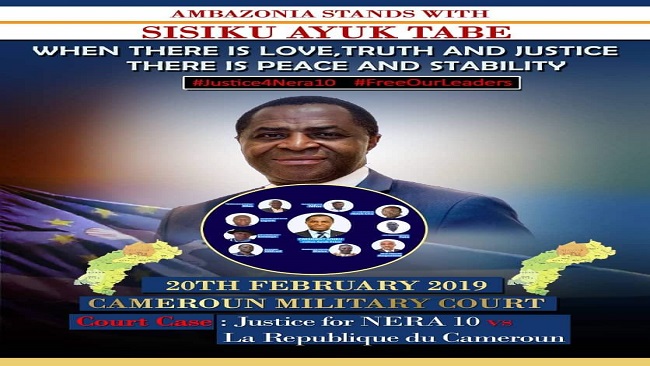Ambazonia’s President Sisiku Ayuk Tabe: Why he matters
From the very beginning of the Southern Cameroons revolution, the Ambazonian Interim President Sisiku Ayuk Tabe neither looked nor sounded like a born leader. However, Sisiku Ayuk Tabe is still directing the Southern Cameroons resistance and quest for independence from the Kondengui High Security Prison in Yaounde! This begs the question: How is he doing it?
The Ambazonian leader is indeed hated and venerated in equal measure and he is currently dominating the Southern Cameroons landscape, and with it, much of the Southern Cameroons resistance map. His abduction in Abuja, Nigeria and subsequent extradition to Yaounde, almost signaled the beginning of the end of the Southern Cameroons revolution that reawakened the national consciousness of Anglophones in Cameroon and allowed them the possibility of determining their own fate on their own land.
Frankly speaking, authentic national leaders do not arise often. They are forged more by fate and circumstance than by human design. This is how Sisiku Ayuk Tabe came to the lime light as the Southern Cameroons leader. He has been leading Southern Cameroonians slowly but surely out of the material, political and moral devastation orchestrated by French Cameroun for 57 years. The fact that the United Nations Security Council accepted that the crisis in Anglophone Cameroon today occupies a central place in world affairs is thanks to Sisiku Ayuk Tabe and his leadership style. His removal of Dr Samuel Ikome Sako as Acting President and appointing a Vice President in the person of Dabney Yerima may be open to dispute and it may also be too early to pass a final verdict on them.
However, without the Ambazonian Interim Government and the coming of Sisiku Ayuk Tabe, the Southern Cameroons issue would have remained no more than yet another minor internal conflict alongside the many other crises lingering on the periphery of the United Nations’s conscience. His detractors have opined that the dismissal of Sako Ikome marred his reputation, and that directing the revolution from a French Cameroun prison is not in the best interest of Southern Cameroonians. It is now evidently clear that Sako’s departure has paved the way for an unwavering commitment to financing Ground Zero and diplomacy have substituted Chris Anu’s noise making ethos. The appointment of a Vice President has also proven to be a more successful path for fulfilling Southern Cameroons aspirations.
The future of French Cameroun’s union with Southern Cameroons appears bleak. But Southern Cameroonians have not been able to take advantage of the situation for the simple fact that the Ambazonian Interim Government’s authority was depleted by a period of failed Sako leadership and corruption. The Southern Cameroons diaspora has never been so frustrated with the irresponsible leadership of Sako Ikome until recently that they faced a kind of denial and deprivation led by the man they once referred to as their powerful Communications Secretary, Chris Anu. The new Vice President has within a short period of time cut across the Southern Cameroons political and geographical boundaries and Vice President Dabney Yerima now embodies the will and aspirations of most Ambazonians. The assertion that there are two parallel Ambazonian Interim Governments has limited credibility.
President Sisiku Ayuk Tabe’s untiring work ethic remains one of his most powerful assets that pushed Southern Cameroonians to rally behind the Interim Government. This is a man who took no break or time off from the struggle until his abduction in Nigeria when compared with Sako who including his so-called lieutenants and associates appeared with a generally more relaxed pace wasting Ambazonia money in hotels, restaurants and renting luxurious cars. Dr Samuel Ikome Sako will be remembered as a leader who manipulated his time to suit his purposes. Sako thought about nothing of summoning cabinet ministers, members of the Southern Cameroons Restoration Council and Ground Zero commanders.
Sisiku Ayuk Tabe who had no traditional tools of power or control over Ambazonia land and resources used his working habits as an essential part of his influence and moral persuasion. From its very early beginning, the Southern Cameroons struggle was complicated by the North West/South West Divide that separated the clusters that constituted the Ambazonia political universe. Welding these disparate elements together and maintaining them till this day is one of the greatest achievements of the Ambazonia Interim Government under Sisiku Ayuk Tabe. Southern Cameroons liberation movements such as CAM, SCNC, SCYL never acquired an independent base or long-lasting territorial haven. But Sisiku Ayuk Tabe provided one in Nigeria which still operates after his abduction in Abuja.
By Chi Prudence Asong in London





